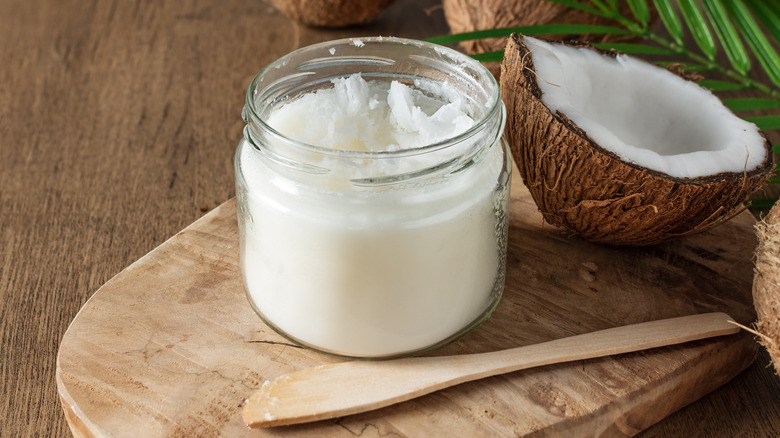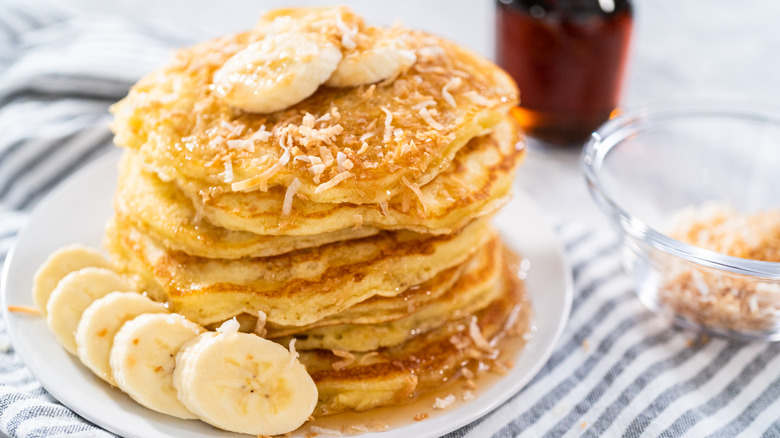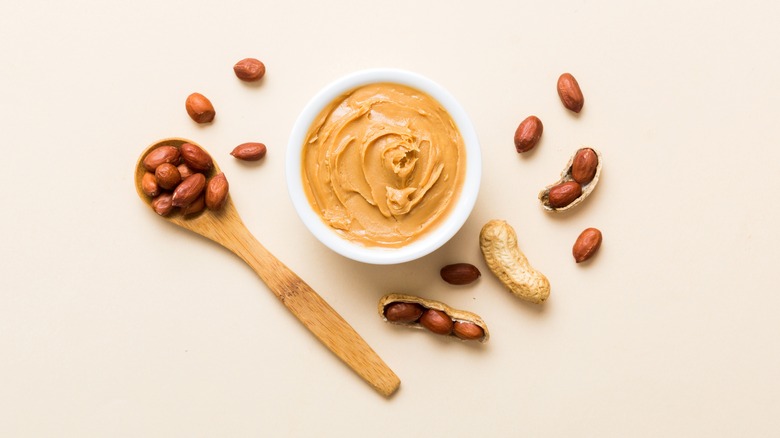How Coconut Butter Measures Up As A Peanut Butter Alternative
Peanut butter is a highly versatile ingredient for everything from morning smoothies to savory Thai panang curry, but it can also be a food that some people need to avoid since peanuts are among the nine most common food allergies. When it comes to safe substitutions for peanut butter, it can be tricky to find something that measures up to its unique texture, taste, adaptability, and nutritional content. There is one option that works pretty well, however: coconut butter.
As with peanuts, the name "coconut" is somewhat of a misnomer since neither food is technically a nut. (Peanuts are legumes and coconuts are fruits, which means they aren't grouped with tree nuts.) While peanut butter and coconut butter have their own distinct flavors, they are similar in consistency. Because coconut butter is solid at room temperature and becomes softer at high temperatures, it can be spooned and spread just like peanut butter can, thickening or coating foods to add richness and creaminess in a diverse range of recipes.
Ways to use coconut butter in place of peanut butter
Like peanut butter, coconut butter is made by grinding up the primary ingredient into a dense, flavorful paste. (Both ingredients are distinct from coconut oil or peanut oil, which are made using presses that only extract the oils for a lightly-flavored liquid product.) This makes coconut butter an ideal alternative in terms of consistency and versatility, but it's definitely not a subtle shift in taste — and the key to using coconut butter as a recipe replacement is to embrace this difference.
Both peanuts and coconuts have tasting notes of earthiness and nuttiness, but the latter has a distinctly tropical flair. You can emphasize this by incorporating additional elements, such as toasted coconut flakes, into dishes like homemade oatmeal, then top it with more tropical treats like diced mango or a scoop of fresh passionfruit.
Coconut butter is a perfect swap in peanut butter and banana pancakes for another tropical combination, as well as in many baked goods, where it can add a sensation of warmth and complexity. It can also transition just as easily into savory meals, such as spicy Thai peanut veggie burgers, where it binds the patties together and enhances the taste of the island spice blend.
Nutritional content of coconut butter versus peanut butter
When comparing the nutritional content of coconut butter versus peanut butter, one of the key differences is the amount of protein. While peanut butter offers a whopping 22 grams of protein per 100 grams of the spread, in that same quantity, coconut butter contains just seven grams of protein. If you're looking to get more of this essential nutrient into your daily diet, you can compensate by also adding in protein-rich foods like chickpeas, Greek yogurt, cottage cheese, quinoa, or pumpkin seeds — either directly into the recipe or as a topping or side to your meal.
Both coconut butter and peanut butter also contain trace amounts of minerals that are essential in a healthy diet, including iron, magnesium, and potassium. Amid the many benefits of cooking with coconut oil, however, there has been some concern about its high saturated fat content, of which 62-70% is medium-chain triglyceride (MCT), according to a 2020 study in the Journal of Cardiovascular Development and Disease.
This study explores how increased consumption of saturated fats can lead to an increased risk of heart disease, while also highlighting how the medium-chain fatty acids in coconuts are processed differently by the body than other kinds of fat and can likewise have positive effects on overall health, including possible improvements in cognitive function. As research continues, it may be best to use coconut butter in moderate quantities as an alternative to peanut butter.



